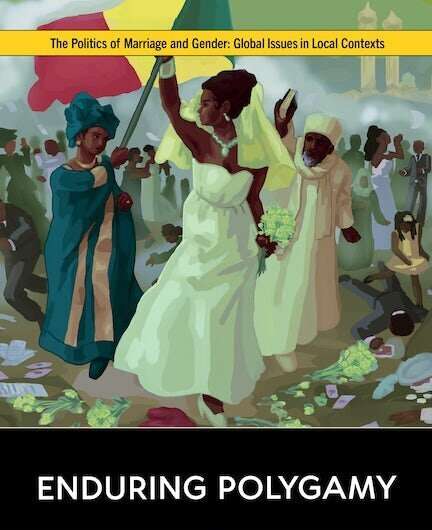Why does polygamy endure in urban environments?
Experts have long believed that in fast-growing, urban environments, polygamy would disappear. In Bamako, Mali, where the population is nearly 3 million and rapidly growing, and economic incentives to polygamy have faded, this hasn’t been the case.
Currently, one in four wives is in a polygamous marriage in Bamako—the highest rate in any major city.
Is Bamako proving that polygamy can thrive in an urban environment?
After 15 years of research, Bruce Whitehouse, associate professor of anthropology, determined how, and why, plural relationships are still widespread in Bamako.
He explores his findings in his latest book, “Enduring Polygamy: Plural Marriage and Social Change in an African Metropolis,” publishing April 14 with Rutgers University Press.
“Enduring Polygamy” explores topics of monogamous and polygamous marriages in Bamako, household dynamics, Malian culture, and more.
Whitehouse, a leading scholar on Mali, has been studying marriage in Mali since 2008. His studies include field work in Bamako with Lehigh student researchers in 2010, and again in 2011 in the Fulbright Program. His most recent trip to Mali was in 2020.
During his time in Bamako, three themes became evident. Demographics play a role in how polygamy persists, Whitehouse says.
To be considered an adult in Malian society, women must marry. And most do, he explains. In Bamako, there are more women in the marriage market than men, and the majority marry under the age of 20. Other considerations include social and cultural impact, and political and legal factors.
Historically, Islam justifies plural marriage for men and this organization of Malian society, as Islamic men can marry up to four wives.
Politically, laws are applied and interpreted in a way that gives men options, Whitehouse explains. And monogamous marriage contracts are often not enforced.
Will polygamy continue to prevail in Bamako? The answers are as yet to be seen.
Women of Bamako are often wary of polygamy, Whitehouse said, and during his research, many expressed the sense that they had little choice.
“Polygamous marriage as an accepted practice in Bamako has set the standard for all other marriages,” Whitehouse says. “Women who hope for monogamy are at risk of being stigmatized.”
Women have a lack of bargaining power with men, he adds.
“Polygamy will remain widespread in Bamako until women are empowered to refuse marriages they don’t want,” Whitehouse explains.
Citation:
Why does polygamy endure in urban environments? (2023, April 14)
retrieved 14 April 2023
from https://phys.org/news/2023-04-polygamy-urban-environments.html
This document is subject to copyright. Apart from any fair dealing for the purpose of private study or research, no
part may be reproduced without the written permission. The content is provided for information purposes only.

Experts have long believed that in fast-growing, urban environments, polygamy would disappear. In Bamako, Mali, where the population is nearly 3 million and rapidly growing, and economic incentives to polygamy have faded, this hasn’t been the case.
Currently, one in four wives is in a polygamous marriage in Bamako—the highest rate in any major city.
Is Bamako proving that polygamy can thrive in an urban environment?
After 15 years of research, Bruce Whitehouse, associate professor of anthropology, determined how, and why, plural relationships are still widespread in Bamako.
He explores his findings in his latest book, “Enduring Polygamy: Plural Marriage and Social Change in an African Metropolis,” publishing April 14 with Rutgers University Press.
“Enduring Polygamy” explores topics of monogamous and polygamous marriages in Bamako, household dynamics, Malian culture, and more.
Whitehouse, a leading scholar on Mali, has been studying marriage in Mali since 2008. His studies include field work in Bamako with Lehigh student researchers in 2010, and again in 2011 in the Fulbright Program. His most recent trip to Mali was in 2020.
During his time in Bamako, three themes became evident. Demographics play a role in how polygamy persists, Whitehouse says.
To be considered an adult in Malian society, women must marry. And most do, he explains. In Bamako, there are more women in the marriage market than men, and the majority marry under the age of 20. Other considerations include social and cultural impact, and political and legal factors.
Historically, Islam justifies plural marriage for men and this organization of Malian society, as Islamic men can marry up to four wives.
Politically, laws are applied and interpreted in a way that gives men options, Whitehouse explains. And monogamous marriage contracts are often not enforced.
Will polygamy continue to prevail in Bamako? The answers are as yet to be seen.
Women of Bamako are often wary of polygamy, Whitehouse said, and during his research, many expressed the sense that they had little choice.
“Polygamous marriage as an accepted practice in Bamako has set the standard for all other marriages,” Whitehouse says. “Women who hope for monogamy are at risk of being stigmatized.”
Women have a lack of bargaining power with men, he adds.
“Polygamy will remain widespread in Bamako until women are empowered to refuse marriages they don’t want,” Whitehouse explains.
Citation:
Why does polygamy endure in urban environments? (2023, April 14)
retrieved 14 April 2023
from https://phys.org/news/2023-04-polygamy-urban-environments.html
This document is subject to copyright. Apart from any fair dealing for the purpose of private study or research, no
part may be reproduced without the written permission. The content is provided for information purposes only.
